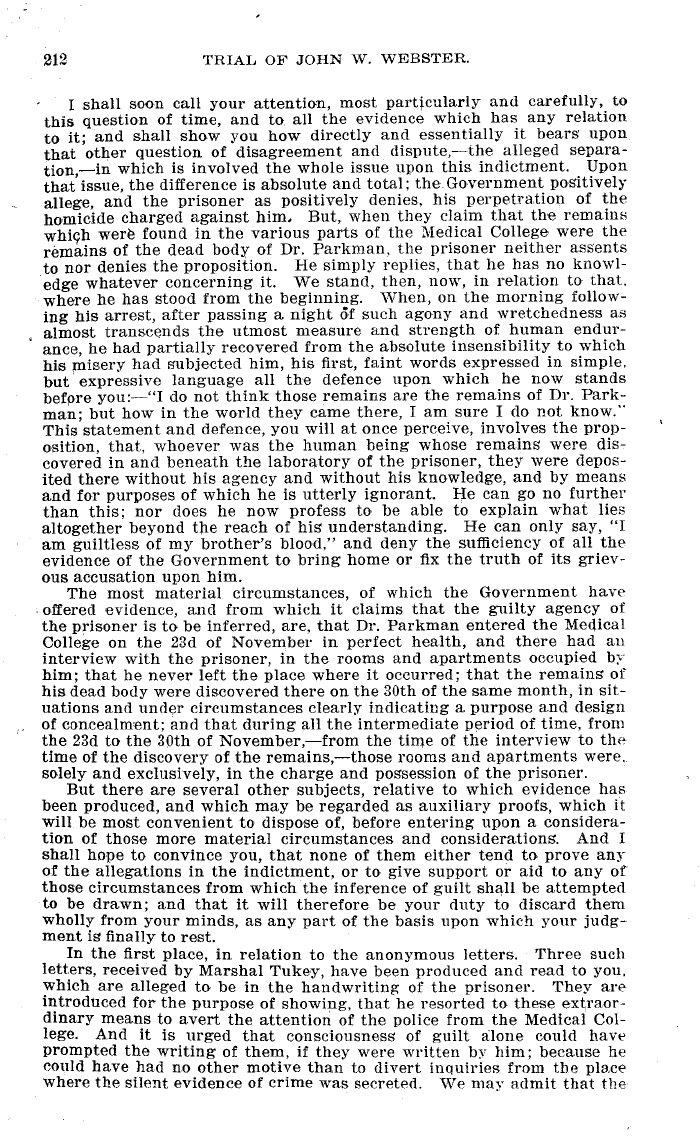|
21~ TRIAL OF JOHN W. WEBSTER.
I shall soon call your attention, most particularly and carefully, to
this question of time, and to all the evidence which has any relation
to it; and shall show you how directly and essentially it bears upon
that other question of disagreement and dispute,-the alleged separa-
tion,-in which is involved the whole issue upon this indictment. Upon
that issue, the difference is absolute and total; the.Government positively
allege, and the prisoner as positively denies, his perpetration of the
homicide charged against him. But, when they claim that the remains
which wer8 found in the various parts of the Medical College were the
remains of the dead body of Dr. Parkman, the prisoner neither asserts
to nor denies the proposition. He simply replies, that he has no knowl-
edge whatever concerning it. We stand, then, now, in relation to that,
where he has stood from the beginning. When, on the morning follow-
ing his arrest, after passing a night of such agony and wretchedness as
almost transcends the utmost measure and strength of human endur-
ance, he had partially recovered from the absolute insensibility to which
his misery had subjected him, his first, faint words expressed in simple,
but expressive language all the defence upon which he now stands
before you: "I do not think those remains are the remains of Dr. Park-
man; but how in the world they came there, I am sure I do not know."
This statement and defence, you will at once perceive, involves the prop-
osition, that, whoever was the human being whose remains were dis-
covered in and beneath the laboratory of the prisoner, they were depos-
ited there without his agency and without his knowledge, and by means
and for purposes of which he is utterly ignorant. He can go no further
than this; nor does he now profess to be able to explain what lies
altogether beyond the reach of his understanding. He can only say, "I
am guiltless of my brother's blood," and deny the sufficiency of all the
evidence of the Government to bring home or fix the truth of its griev-
ous accusation upon him.
The most material circumstances, of which the Government have
offered evidence, and from which it claims that the guilty agency of
the prisoner is to be inferred, are, that Dr. Parkman entered the Medical
College on the 23d of November in perfect health, and there had an
interview with the prisoner, in the rooms and apartments occupied b -him;
that he never left the place where it occurred; that the remains of
his dead body were discovered there on the 30th of the same month, in sit-
uations and under circumstances clearly indicating a purpose and design
of concealment; and that during all the intermediate period of time, from
the 23d to the 30th of November,-from the tune of the interview to the
time of the discovery of the remains,-those rooms and apartments were,
solely and exclusively, in the charge and possession of the prisoner.
But there are several other subjects, relative to which evidence has
been produced, and which may be regarded as auxiliary proofs, which it
will be most convenient to dispose of, before entering upon a considera-
tion of those more material circumstances and considerations. And I
shall hope to convince you, that none of them either tend to prove any
of the allegations in the indictment, or to give support or aid to any of
those circumstances from which the inference of guilt shall be attempted
to be drawn; and that it will therefore be your duty to discard them
wholly from your minds, as any part of the basis upon which your judg-
ment is finally to rest.
In the first place, in relation to the anonymous letters. Three such
letters, received by Marshal Tukey, have been produced and read to you,
which are alleged to be in the handwriting of the prisoner. They are
introduced for the purpose of showing, that he resorted to these extraor-
dinary means to avert the attention of the police from the Medical Col-
lege. And it is urged that consciousness of guilt alone could have
prompted the writing of them, if they were written by him; because he
could have had no other motive than to divert inquiries from the place
where the silent evidence of crime was secreted. We may admit that the
|

